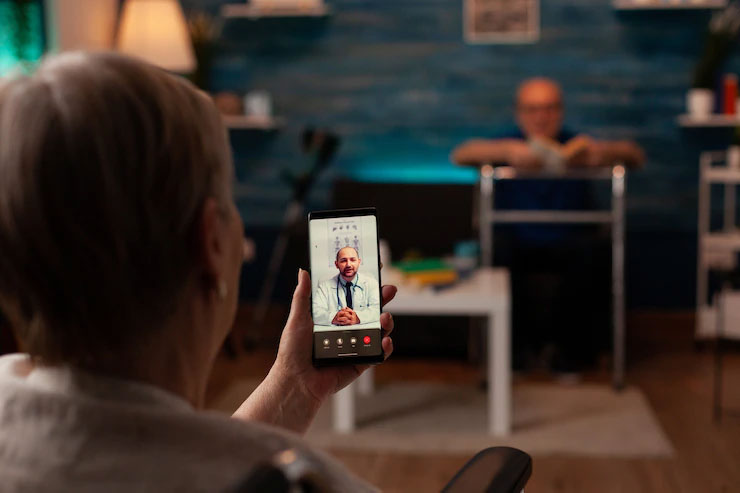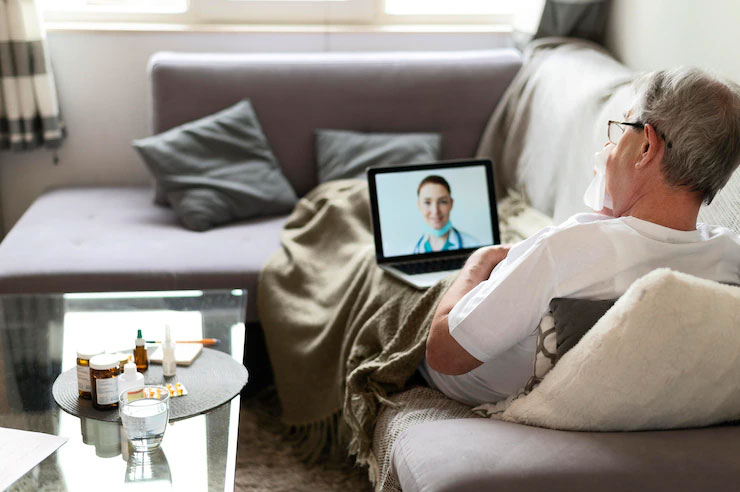
What Is Virtual Healthcare?
Virtual healthcare refers to the “virtual visits” that take place between clinicians and patients via communications technologies — the video and audio connectivity that allows “virtual” meetings to occur from virtually any location, in real time..A virtual visit can be a videoconference between a patient and a doctor at home. It means that a patient can interact with an off site medical specialist via a high-definition conference hookup at his or her local clinic, instead of travelling to another city. It gives patients the chance to more readily find qualified second opinions online.
Thus far, virtual healthcare has been used chiefly for meetings and consultations, check-ins, and status reports, rather than for in-depth diagnosis or treatments. Still, as the technology evolves, more serious conditions like diabetes are falling under the influence of virtual healthcare.
Virtual healthcare also better enables specialists to monitor situations or procedures from remote locations. Patient monitoring at home has also been shown to be useful for treating patients with chronic conditions like diabetes and hypertension, where rehospitalizations too often occur due to lack of communications or transparency about the patient’s condition.
Advantages of virtual healthcare.
The Benefits of Virtual healthcare are numerous for patients and health systems.
- Better access to care : Virtual healthcare appointments are promising for patients living in remote, rural, or underserved areas. Virtual healthcare can become a lifesaving offering for many people, especially true, when there is a shortage of qualified providers near their homes. Virtual healthcare technology can open care channels too, the American Telemedicine Association says.
- Better quality of care : The American Medical Association says virtual healthcare can improve the quality of patient care. Additionally, the AMA says patient-physician relationships are stronger as access expands and more services are available remotely.
- Convenience : According to AARP, patients waste more time than one might think on routine doctor visits, whether it’s sitting in stop-and-go traffic or a waiting room. Travel time takes time, and patients.
- Managing chronic conditions : Virtual healthcare is being used by many health systems to monitor ongoing health conditions, including diabetes, high blood pressure, and even COPD.
- Treating urgent symptoms : Patients can gain almost immediate access to caregivers for an initial appointment. In-person follow-up care may be required, but patients can get a quick start on the initial process from wherever they are.
- Best care anywhere : No matter the patient’s location – another city or in another country — telehealth is helping to expand access to doctors and services. For example, retirees tend to travel a lot and may need care from home. Virtual visits make it easier to coordinate care with those on the go.
- Reduced healthcare costs : Virtual healthcare could result in $6 billion per year in savings, according to Towers Watson. The reason: Better management of chronic diseases, reduced travel times, and fewer or shorter hospital stays. Those are wins for everyone.
- Better self-care of chronic conditions : Self-care is more efficient with virtual care. For example, individuals with diabetes can use mobile technology to manage their life, diet, and health. By doing so, they reduce the need for in-person encounters.

For health systems, the Benefits of Virtual healthcare are slightly different. Virtual healthcare can augment human resources, expand clinical capacity, and improve efficiencies, as well as provide the above-listed benefits for patients. An additional benefit of virtual healthcare is that it allows health systems to move patients to become more involved with their care. In other words, engaged patients.
Virtual healthcare also can streamline in-person exams by collecting patients’ information, gathering symptom data, and identifying potential options of care before the actual visit. By collecting this patient information in advance, physicians save time to review possible treatment options and interact more with the patient. Direct virtual care communication with a patient before an office visit creates time savings for a medical practice and the patient. Estimates produced by virtual care technologies are anticipated to be about five minutes per encounter per physician.

Key Takeaways
Virtual care, telehealth, and telemedicine are paramount to healthcare providers and patients to improve efficiency in several ways.
Virtual care has been a part of our healthcare system for decades, but hasn’t had a significant impact until the COVID-19 pandemic emerged.
Maintaining access to remote care has been particularly important and continues to shift our health care organisation for the long haul. A big takeaway from the pandemic is that it doesn’t matter how patients engage with the health care system – as long as it’s high-quality, valuable, and patient-centred.
Conclusion
Virtual healthcare has a critical role to play in modern healthcare. The ability of nurses and caregivers to connect with patients no matter where they are leads to better outcomes and healthier populations.
For health systems, virtual healthcare is essential to reaching and serving people and addressing their business constraints. Virtual healthcare also can be useful for providing second opinions, consultations, chronic condition management, and remote monitoring of certain conditions.
As the capabilities of virtual healthcare improve and as the use of such becomes more widely available, health systems must respond with practical solutions that meet this need.
Implementing these health care systems might be challenging. However, the health care functions in the virtual care systems are more efficient, time-saving, and less expensive than that of the traditional healthcare systems.
Texas Specialty Care provides urgent, primary care to you and your family members. We also have Virtual Healthcare Plans. One should always take advice from a specialist, as it is a matter of your health. Our facility is committed to saving your time and extending its hours to meet your needs. Take your time to decide and call us at 469-545-9983
